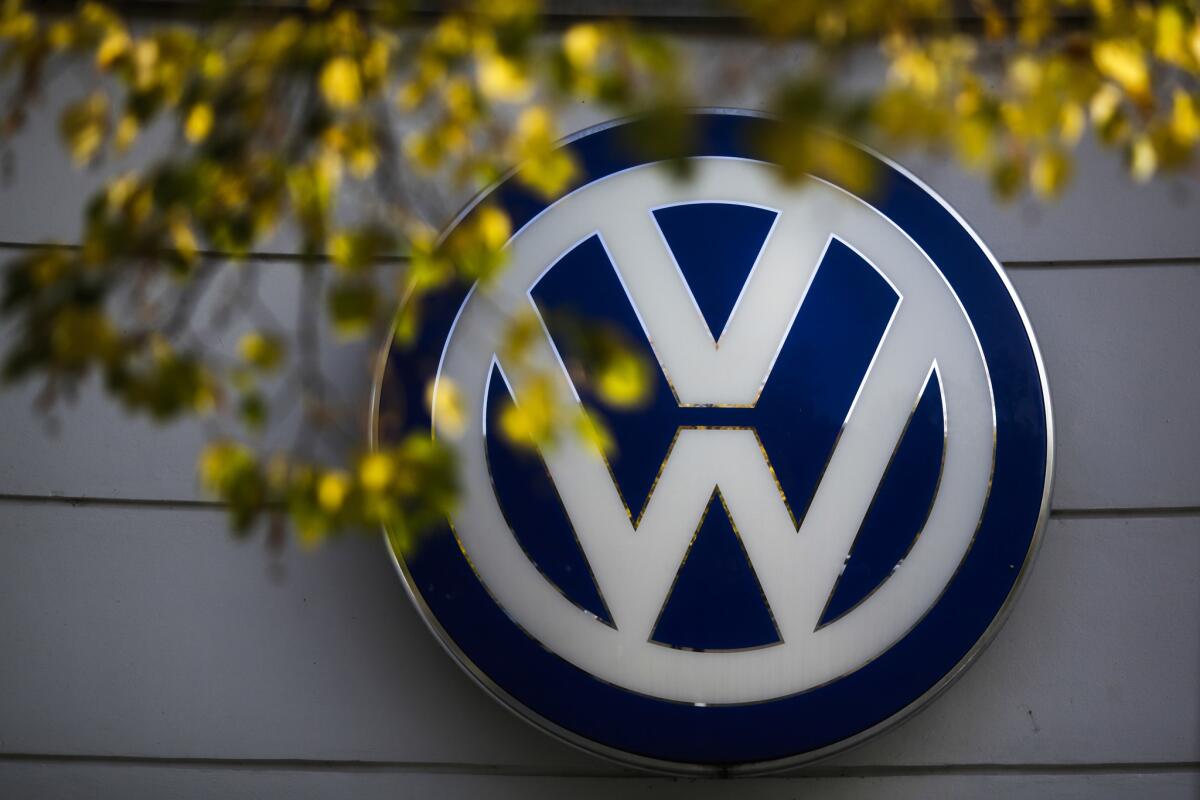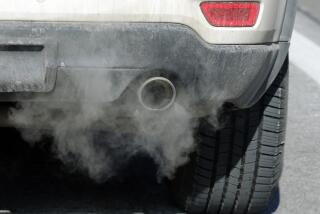VW engineer from California pleads guilty to conspiracy in emissions scandal

A longtime Volkswagen engineer from Southern California pleaded guilty in federal court to charges he helped design and implement a software system that enabled the German automaker’s diesel engines to defeat emissions tests.
The plea is the first from a staffer involved in the cheating scandal, and it signals that the Justice Department is serious about holding Volkswagen employees personally and criminally responsible for producing about half a million cars that spew up to 40 times the legally allowed amount of pollutants into the atmosphere.
James Robert Liang, 62, a Newbury Park resident, pleaded guilty in federal court in Detroit to a single charge of conspiring to defraud the United States, commit wire fraud and violate the Clean Air Act. He faces up to five years in prison and a $250,000 fine.
“Today’s charges are the first shoe to drop in the Volkswagen criminal case, but certainly not the last,” said David Uhlmann, a law professor at the University of Michigan and former chief of the Justice Department’s environmental crimes section. “The open question is whether the evidence will allow prosecutors to charge senior executives at Volkswagen.”
Neither Liang nor his attorney could be reached for comment.
Public records link Liang to a single-story, four-bedroom home in a gated community in the hills of Thousand Oaks.
On Friday, the shutters on street-facing windows were pulled down tight. A silver four-door Volkswagen sat in the driveway, while another silver Volkswagen car was parked on the street, directly in front of the home.
As part of the plea agreement, Liang will cooperate with the government in its ongoing criminal investigation, the U.S. Department of Justice said in a statement. Such cooperation is generally a sign that federal prosecutors are seeking to charge others in a scheme.
The plea agreement describes a conspiracy that spanned nearly a decade.
Liang had worked in Volkswagen’s diesel development department in Wolfsburg, Germany, starting in 1983. In 2006, he and his “co-conspirators” started work on a new diesel engine for U.S. vehicles, the plea agreement says.
As described in a 25-page indictment unsealed Friday along with the plea deal, Liang and the other VW employees at Volkswagen knew “from almost the beginning of VW’s process to design its new ‘clean diesel’ vehicles” that the cars “would not meet U.S. emissions standards.”
When they realized that they could not design an engine that would adhere to the strict U.S. standards, while also delivering solid road performance, they created and implemented so-called defeat devices — software that could recognize when cars were being tested “in order to cheat” the tests, according to court papers.
If the software detected the vehicle was undergoing a test, it told the car to emit only enough nitrogen oxide to pass the inspection. Otherwise, the court papers allege, it permitted the cars to pump substantially more nitrogen oxide into the atmosphere.
In a statement released Friday, the Justice Department said Liang admitted to using the software while working on the diesel engine and “assisted in making the defeat device work.”
Volkswagen said in a statement that it is “continuing to cooperate with the U.S. Department of Justice,” but couldn’t comment on the indictment.
In 2008, Liang transferred to the U.S. to help launch Volkswagen’s new “clean diesel” vehicles, according to the plea agreement. While working at VW’s test facility in Oxnard, he served as “leader of diesel competence.”
According to the plea agreement, Liang said he and his co-conspirators “misrepresented” that the VW diesel vehicles met U.S. emissions standards during certification meetings for new cars with the U.S. Environmental Protection Agency and the California Air Resources Board and “hid the existence of the defeat device from regulators.”
According to court papers, Liang and his fellow engineers did not stop at creating the defeat devices — they improved them.
As the engines aged, Volkswagen noticed increasing complaints about parts and components breaking down.
Engineers believed that the surge in warranty claims was “a result of the vehicle operating in ‘testing mode’ too long rather than switching to ‘road mode,’ ” prosecutors wrote.
To blunt the claims, Liang and his fellow employees upgraded the defeat device to help cars better recognize when they no longer were being tested. Volkswagen then pushed the software update out to unwitting customers, claiming that it was intended to improve their cars and never mentioning that it was partly to cheat emissions tests.
Liang and his co-conspirators continued to lie to the EPA and state Air Resources Board, even after regulatory agencies started to raise questions about the vehicles’ performance, the plea agreement says.
The scandal erupted last September when the Air Resources Board and the EPA said they had discovered the software in certain 2-liter VW diesel vehicles. In regular driving, they said, the vehicles spew up to 40 times the legally allowed amount of nitrogen oxide.
Regulators later said the defeat devices also were installed in some Volkswagen and Audi 3.0-liter diesel vehicles as well.
Volkswagen in June agreed to pay up to $14.7 billion to settle government allegations in the U.S. linked to its cheating on emissions tests and to buy back or terminate the leases of nearly half a million of its cars.
The German automaker will spend up to $10 billion to buy back or modify VW and Audi 2.0-liter diesel vehicles in the U.S. It also will pay $2.7 billion into a trust to support environmental programs and reduce emissions. The settlement was reached with the Justice Department, state attorneys general and other agencies, as well as car owners.
The agreements represented the largest settlement in U.S. history with an automaker.
Times staff writer Neal J. Leitereg contributed to this report.
UPDATES:
11:30 a.m.: This article was updated with additional information about the indictment.
10 a.m.: This article was updated with additional information about the plea agreement.
8:55 a.m.: This article was updated throughout with staff reporting.
This article was originally published at 8:20 a.m.
More to Read
Inside the business of entertainment
The Wide Shot brings you news, analysis and insights on everything from streaming wars to production — and what it all means for the future.
You may occasionally receive promotional content from the Los Angeles Times.












